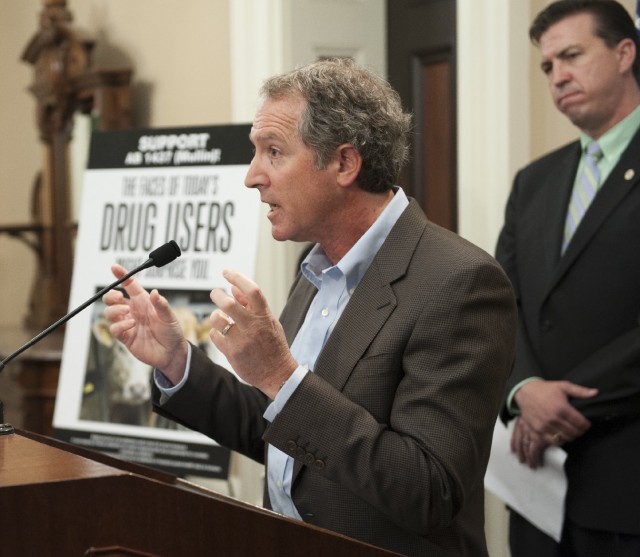There is reason critics are skeptical about how much change is actually happening. The European Union took a similar step banning the use of antibiotics for animal growth promotion back in 2006. A study of antibiotic use in the Netherlands found that usage actually went up in chickens in the ensuing years. It seems as if chicken ranches and feed lots continued to use antimicrobials at the same rate, but for disease prevention instead of overtly for growth promotion. It wasn’t until 2009 that rates began to tumble when bans on most of those prophylactic uses of antibiotics started to take effect.
Like a similar bill that U.S. Sen. Dianne Feinstein (D-Calif.) has been floating for several years, Mullin’s bill seeks to mirror those tougher European standards.
On Tuesday, Dr. David Relman, an infectious disease specialist from Stanford University, spoke at a Sacramento press conference in favor of AB 1437. He said he is treating more and more patients who have contracted so-called superbugs. He recalled one case last year that haunts him, a woman with an infection in her bloodstream that was resistant to every known antibiotic. He couldn’t save her.
When asked if the prolific use of antibiotics in livestock were really partly to blame for her death, Relman said, “To that particular woman, we can't say. But to many, many woman and men like her, we would have to say the burden of evidence says yes.”
That burden of evidence includes some studies that are showing more conclusive evidence of resistant pathogens in animals jumping to people. A recent Johns Hopkins School of Medicine examination found that residents living near a pig farm in Pennsylvania were more likely to become infected with methicillin-resistant Staphylococcus aureus (MRSA) bacteria.
The real worry is the unknown. As Relman described it, antimicrobial resistance is a bit like climate change. Every bit of antibiotic overuse can add up to a bigger problem.
But Bill Mattos, president of the California Poultry Association, says the health concerns over the use of antibiotics in livestock are being overblown.
“Most of the problem comes from doctors overmedicating their patients," Mattos said. "That’s where the problem is because everybody wants antibiotics when they get sick."
Mattos said he is confident that AB 1437 won’t survive its committee hearing next week because the bill doesn’t have enough supporters. The Poultry Association is backing a competing and more modest bill in the State Senate authored by Jerry Hill (D-San Mateo). Hill’s bill essentially makes the recent FDA’s recommendations mandatory, rather than voluntary in California.
Mattos said every year California produces 300 million chickens. Those chickens employ and feed a lot of people.
“If you want an antibiotic free product, you can buy it. It says it on the label. Ten to 15 percent of people are looking for antibiotic free, 80 percent don’t care,” Mattos said.
On Tuesday, in his assembly office, Mullin — who represents cities in San Mateo County just south of San Francisco — was sounding like a man about to possibly lose a battle.
“There is no question that in this building, we are in an uphill fight to get this public health issue heard and to have action taken on the bill," Mullin said. "But we remain optimistic and hopeful that as the general public becomes more aware of these concerns, that that will change the political calculus at the state capital.”
